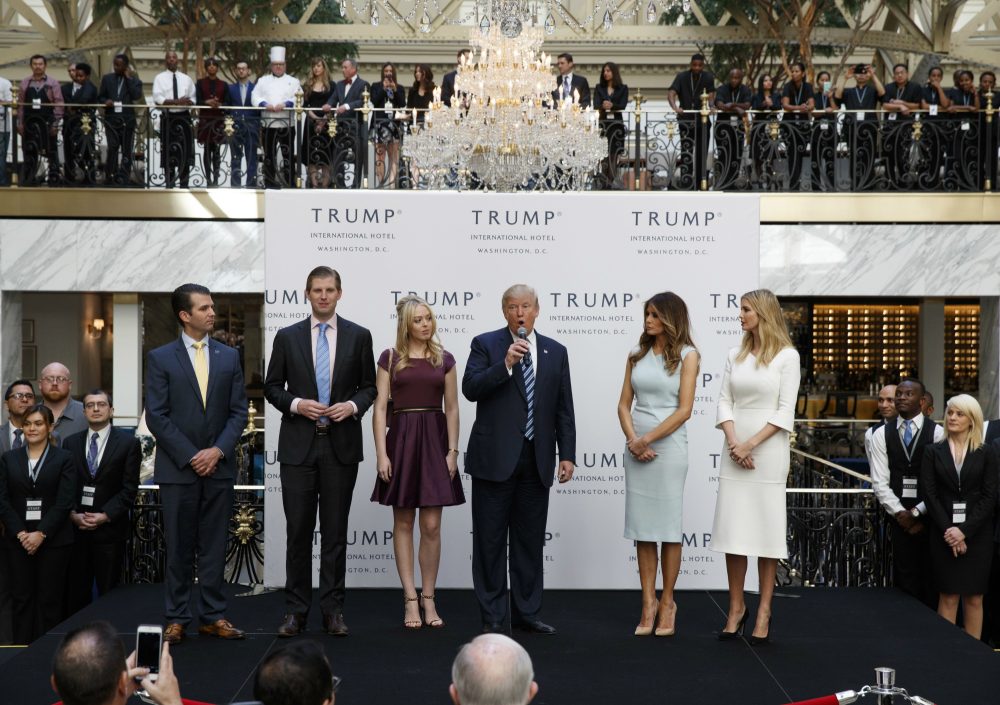Advertisement
Donald Trump, And The Normalization Of What Isn’t Normal At All

COMMENTARY
Donald Trump prides himself on being unpredictable, but here’s one prediction we can confidently make: He will never release his tax returns.
Only reporters “care about my tax returns,” he asserted at his brief, belated press performance last week. "I won; I mean, I became president."
In fact, a majority of Americans, 60 percent, including 38 percent of Republicans, agree that the president-elect “has a responsibility to release his tax returns,” the Pew Research Center reports. The Washington Post finds that 74 percent of Americans believe he should release his returns. But if Trump is wrong in claiming his Electoral College victory means voters “don’t care at all” about his returns, he’s probably right to gamble that many voters don’t care deeply and that questions about his returns will subside the longer he refuses to release them.
...the unprecedented scope and complexity of Trump’s conflicts effectively normalizes them. If one source of conflict, like the Clinton Foundation, constitutes a scandal, a thousand or more sources of conflict constitute business as usual.
Even general concern about Trump's unprecedented conflicts of interest is declining. Fifty-seven percent of Americans expressed concern about them in January, compared to 65 percent in December, according to the same Pew study, even though recent news reports have shown how the Trump family, (Ivanka and her husband, new senior White House adviser Jared Kushner, for example) mix personal and state business.
Trump’s promise to abstain from foreign deals and surrender management of his company to his sons during his presidency will not significantly lessen the likelihood of corruption, obviously. Nonpartisan ethics experts have dismissed this plan as a fig leaf. So long as Trump owns his company, whether or not it takes on new foreign entanglements, his myriad conflicts remain. He retains knowledge of his business interests and how they’ll be affected by administration policies. And his promise not to talk to his sons about business is simply not credible, as well as impossible to enforce, in any case.
Advertisement
Still, this charade will likely mollify many voters, including some who didn’t vote for him. In fact, a slight majority of Americans, 52 percent, are satisfied with Trump’s claim that he is turning over management of his organization to his sons, according to an unsurprising Washington Post poll. Most people are probably not paying close attention to questions of conflict, and many won’t appreciate the relatively nuanced questions they raise. Besides, the unprecedented scope and complexity of Trump’s conflicts effectively normalizes them. If one source of conflict, like the Clinton Foundation, constitutes a scandal, a thousand or more sources of conflict constitute business as usual.
Trump’s conflicts are literally innumerable: His business is opaque; his tax returns a secret. We may never know the extent of his conflicts, including his debts to regulated institutions seeking favorable treatment from the administration. But we do know enough to be alarmed. According to the Wall Street Journal, the Trump Organization is indebted to “over 150 institutions … scattered across Wall Street banks, mutual funds, and other financial institutions, broadening the tangle of interests that pose potential conflicts.” His lenders include Deutsche Bank, for example, owed $340 million by Trump entities and currently under investigation by the Obama Justice Department.
Of course, Trump’s alleged ties to Russia are particularly disturbing, especially considering his remarkably consistent support and admiration for the autocratic Vladimir Putin, as well as his suspect denials of financial entanglements. Trump’s decades-long history of chasing Russian deals is well documented, as the Washington Post reports, and his own son has contradicted his claim that he “has nothing to do with Russia.” According to Donald Jr., “Russians make up a pretty disproportionate cross-section of a lot of our assets. We see a lot of money pouring in from Russia.”
The FBI may or may not be investigating Trump’s alleged Russian connections. (Director James Comey has declined to say when asked by members of Congress, laughably claiming he doesn’t comment on pending investigations.) Multiple journalists are, no doubt, pursuing the story of the alleged Siberian candidate. But Buzzfeed did Trump a favor by releasing sensational, unsubstantiated allegations about his Russian relationships and obligations, including descriptions of a virtual partnership between Russian operatives and Trump’s campaign. Release of this report gave Trump a legitimate complaint against shoddy journalism, advancing his crusade to discredit all critical press coverage, regardless of its merits, including, most notably, coverage of Russia’s role in the election.
Trump’s recent attack on CNN and his refusal to entertain a question from CNN reporter Jim Acosta is a chilling preview of how he and his Republican allies will try controlling the press. Favorable coverage will be rewarded with praise and access; critics will be tarred as purveyors of fake news and barred even from asking questions, if not deprived of their credentials. “The CNN reporter who was disruptive to the press briefing, & disrespectful to Trump-should be fired & prohibited from any press briefings,” a Republican congressman tweeted in support of Trump’s performance.
...if Trump is wrong in claiming his Electoral College victory means voters “don’t care at all” about his returns, he’s probably right to gamble that many voters don’t care deeply and that questions about his returns will subside the longer he refuses to release them.
Journalists may find some comfort in Trump’s assurance during the campaign that he won’t have them killed (although he seems to be emulating Putin’s autocratic ways). But they will be punished for “disrespect,” and if Trump succeeds in thoroughly discrediting his press critics, he won’t have to worry about the conflicts and corruption they uncover. Exercise of the right to disrespect the president — a right Republicans enthusiastically exploited during Obama’s tenure — may become an exercise in futility.
Presidents often have combative relationships with the press, but Trump’s so far successful style of combat, his thin skin and demands that the press function as a presidential propaganda arm, pose particularly ominous challenges. What was disrespectful about Jim Acosta’s behavior? He tried to ask a question, even though he works for CNN, which in Trump’s view has been insufficiently servile. Disrespect, in the Trumpian lexicon, means failure to flatter. You approach a petty tyrant on bended knee.
